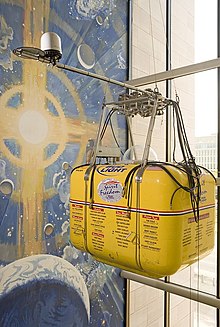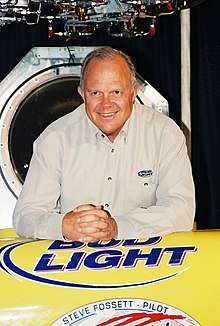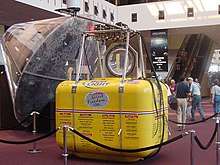Spirit of Freedom (balloon)
Spirit of Freedom balloon was a Rozière balloon designed and built by Donald Cameron and Tim Cole. In 2002 solo pilot Steve Fossett flew the Spirit of Freedom to become the first successful around-the-world nonstop solo flight in any kind of aircraft. On June 19, 2002, the 10-story-high balloon Spirit of Freedom lifted off from Northam, Western Australia, and landed in Queensland, Australia, on July 3, 2002 (Independence Day in the US). The solo flight circumnavigation lasted 13 days, 8 hours, 33 minutes (14 days 19 hours 50 minutes to landing) and covered 20,626.48 statute miles (33,195.10 km). They (Fossett & Spirit of Freedom) reached speeds of up to 322 kilometers (204 miles) per hour, and flew as high as 10,580 meters (34,700 feet).[1][2][3]

Spirit of Freedom
| colspan="2" style="text-align:center;" | First Solo Around The World Balloon Flight Spirit of Freedom balloon just prior to launch |
Balloon | |
|---|---|
| Envelope: | 43 m (140 ft) tall by 18 m (60 ft) wide inflated |
| Fuel: | 38 tanks of Propane & Ethane[1] |
| Type: | Rozier balloon |
| Manufacturer: | Don Cameron of Cameron Balloons Ltd. Bristol, England |
Gondola | |
| Manufacturer: | Tim Cole of Greeley, Colorado [1] |
| Dimensions: | 132 x 94 x 65in., 600lb. (335.28 x 238.76 x 165.1cm, 272.2kg) [1] |
| Material: | Kevlar and carbon [1] |
| Cabin Pressure: | unpressurized |
| Gondola Location: | National Air and Space Museum permanent display |
Steve Fossett’s first significant aviation endeavor was distance ballooning. The year after earning his Lighter than Air FAA certificate, Fossett's first major flight in August 1994 with copilot Tim Cole flew across the Atlantic from Canada to Germany. At that time, no manned balloon had ever flown more than 6 days or 5000 miles. Later, Tim Cole designed and built the Spirit of Freedom gondola and was also selected as Project Director of the Spirit of Freedom flight.[1][4]
On February 21, 1995, Fossett was the first person to make a solo flight across the Pacific Ocean in a balloon from South Korea to Leader, Saskatchewan.[2] On March 21, 1999, the Breitling Orbiter 3 was the first balloon to fly around the world non-stop. [5]

Spirit-of Freedom capsule
After five previous attempts, on Independence Day 2002, Steve Fossett became the first person to fly around the world alone, nonstop in any kind of aircraft in just under 15 days in the Spirit of Freedom balloon. [2]
While Fossett had financed five previous tries himself, his successful record-setting flight was sponsored by Bud Light.[6] In the end, Fossett actually made money on all his balloon flights. He bought a contingency insurance policy for $500,000 that would pay him $3 million if he succeeded in the flight. Along with sponsorship, that payout meant that in the end Fossett did not have to spend any of his money other than for initial expenses.[7]
Balloon
The Spirit-of-Freedom was a Rozière balloon, which combines the features of a hot-air balloon and a gas balloon, with a helium cell within a hot-air envelope. Designed by Donald Cameron of Cameron Balloons Ltd. of Bristol, England. Thirty-eight tanks hanging beside the capsule are filled with 69% propane and 31% ethane fueling the burners on top.[8]The heated air warms the helium to lift the balloon. Steering's accomplished by ascending or descending into favorable wind direction.[1] Initially, the helium cell is filled to approximately 47% of its maximum capacity. During ascent, warming by the sun causes the helium to expand even more than the surrounding air, which aids the balloon in gaining altitude (unlike the expansion caused by the drop in atmospheric pressure, which can even hinder that until the air and helium temperatures equalize). The 140 ft tall balloon envelope utilized a Comstock Autopilot Computer to keep a constant altitude by controlling the burners, this automatic control allowed Fossett time to sleep.[3][1] When joined with the gondola, the entire aircraft measured 180 feet (55 meters) by 108 feet (33 meters).[9]
Capsule
Designed and build by Tim Cole Sr. of Greeley, Colorado, out of kevlar and carbon with a clear bubble hatch. The Spirit-of-Freedom gondola the size of a closet, had a bench and a sleeping bag. Fossett used an autopilot designed by Bruce Comstock to control the burners while he averaged 4 hours of sleep per day in 45 minute naps.[8]He ate military rations called MREs which were heated with water activated chemical heat packs.[1]Fossett would have to regularly climb out into the sub-zero temperatures to change fuel tanks.[3] Besides the Comstock autopilot, the gondola equipment included GPS, Inmarsat, and satellite phone backup for communications with Mission Control at Washington University in St. Louis. Fossett used radios for communications with air traffic control and other aircraft. An Emergency Position Indicating Rescue Beacon (EPIRB) was onboard to aid search and rescue.[1] The unpressurized gondola used lithium batteries to power the electronic equipment. A custom heater designed by engineer Andy Elson regulates the aircraft internal temperature between 4 to 21 C (38-72 F).[1][8]
Flight
Fossett launched the 10-story high balloon Spirit of Freedom from Northam, Western Australia on June 19, 2002 and returned to Australia on July 3, 2002 (Independence Day in the US), subsequently landing in Queensland, Australia. He would climb or descend to navigate via the most favorable winds. Fossett mainly cruised at over 8,000 meters (26,240 feet) and breathed oxygen from a liquid oxygen system.[1] Duration and distance of this solo balloon flight was 13 days, 8 hours, 33 minutes to circumnavigate the globe and 14 days 19 hours 50 minutes to landing total time covering 20,626.48 statute miles (33,195.10 km).[2] The balloon dragged him along the ground for 20 minutes at the end of the flight. The capsule survived the landing and was donated to the Smithsonian Institution in Washington, D.C. where it is on permanent display. The envelope was destroyed in the landing, but a miniature hangs in the Anderson-Abruzzo Albuquerque International Balloon Museum in Albuquerque, New Mexico.[10] [6] The control center for the mission was in Brookings Hall at Washington University in St. Louis.[11] Fossett's top speed during the flight was set over the Indian Ocean. The trip ballooning records include: Fastest (200 miles per hour (320 km/h), breaking his own previous record of 166 miles per hour (270 km/h)), Fastest Around the World (13.5 days), Longest Distance Flown Solo in a Balloon (20,482.26 miles (32,963.00 km)), and 24-Hour Balloon Distance (3,186.80 miles (5,128.66 km) on July 1).[12]
Mission team
Pilot: Steve Fossett
Weather Team: Luc Trullemans Chief Meteorologist; David Dehenauw Assistant Meteorologist.
Mission Control: Joe Ritchie Director; Kevin Stass Air Traffic Specialist; Marcus Raichle M.D. Medical Director; David Butler webmaster
Australia Team: Northam Aero Club; Winward Ballooning; Gren Futland FAI Observer; Dave (Shorty) Ryan Logistics Director; Tony Ryan Support Manager.
Words/Pictures Team: Andy Milk; Errol Considine; Trevor Collens; Phil Yunker; Kevin Bond
Team Members: August Busch III; Barron Hilton; Joe Castellano; Dan McHugh; Sheryl McAndrew; Tara Gray; Pierre D'Avenas; Doug Travis; Dick Smith.
Project Team: Tim Cole Project Director; Dennis Brown Launch Master; Bert Padelt Systems Director; John Kugler Inflation Director; Andy Elson Engineer; Stuart Radnosfsky Commercial Director. [13]
Steve Fossett Round the World efforts
A seven year project, Fossett believed the first solo round-the-world balloon flight as highly important. Developing technology to fly at great durations and distances. He also believed he was the right person to do a solo flight with his balloon, navigation and high altitude experience. He didn't want to be seen as "...the rich guy flying with an expert." Plus flying solo saved significant room and weight. Restricted overflight permissions and dangers by some Northern Hemisphere countries moved efforts to the Southern Hemisphere which had its own dangers. The southern route made search and rescue difficult with hazardous and remote seas. Fossett experienced these threats on Aug. 16, 1998, when a violent thunderstorm ruptured the balloon envelope, falling 29,000 feet into the Coral Sea, 500 miles east of Australia.[7] Search-and-rescue forces picked Fossett up after floating for 23 hours in a raft.[1]
| Jan 8-11, 1996 | Stratobowl, South Dakota | St. John, Canada | covered 2,200 statute miles (3540 km) | Balloon: Solo Challenger | ||||
| Jan 13-20, 1997 | St. Louis, Missouri | Sultanpur | covered 10,360.61 statute miles (16673 km) World Distance Record | World Duration Record 6 days 2 hours 44 minutes | Balloon: Solo Spirit | |||
| Jan 1-5, 1998 | St. Louis, Missouri | Grechanaya, Russia | covered 5,802.94 statute miles (9338 km) | Balloon: Solo Spirit | ||||
| Aug 7-16, 1998 | Mendoza, Argentina | the Coral Sea | covered 14,235.33 statute miles (22,910 km) World Distance Record | Balloon: Solo Spirit | ||||
| Aug 5-17, 2001 | Northam, Western Australia | Bage, Brazil | covered 3,186.80 statute miles (5,128.65 km) | 12 days 12 hours 57 minutes | Balloon: Solo Spirit | |||
| Jul 1-4, 2002 | Northam, Western Australia | Queensland, Australia | covered 20,482.26 statute miles (32,963 km) | 13 days 12 hours 5 minutes (14 days 19 hours 50 minutes to landing) | First Solo RTW Flight | 24 Hour Balloon Distance Record (Jun 30 - Jul 1. 2002) | Jul 1, 2002; Fastest Speed by Manned Balloon 200.24 mph (322.25 kmh) | Balloon: Spirit of Freedom |
See also
- List of circumnavigations
- National Air and Space Museum
- Steve Fossett
- Timeline of hydrogen technologies
- List of firsts in aviation
Further reading
- Fossett, Steve; Hasley, Will (2006). Chasing the Wind: The Autobiography of Steve Fossett. Virgin Books. ISBN 978-1-85227-234-0.
References
- "Bud Light "Spirit Of Freedom" Capsule". airandspace.si.edu. NASM. Retrieved June 2, 2020.
- "Aviation Adventurer Steve Fossett Missing". CBS News. September 4, 2007. Archived from the original on April 25, 2009. Retrieved March 13, 2010.
- "FIRST SUCCESSFUL AROUND THE WORLD SOLO ATTEMPT". balloonsoverbritain.co.uk. Balloons over Britain. Retrieved June 2, 2020.
- National Aviation Hall of Fame
- "BBC - Made in Bristol - Making a model of the Breitlinger Balloon". www.bbc.co.uk. Retrieved March 3, 2019.
- "Capsule, Balloon, / Bud Light Spirit of Freedom Capsule". Collections Database. Washington, DC: Smithsonian National Air and Space Museum. Retrieved October 2, 2008.
- "Steve Fossett: Always "Scouting For New Adventures" Part 1". Airport Journals. October 2006. Archived from the original on December 10, 2010. Retrieved October 2, 2008.
- "A Man Driven to Extremes". LAtimes.com. LATimes. Retrieved June 9, 2020.
- "World-Renowned Adventurer To Launch "Bud Light Spirit of Freedom" in June". Militarypartners.com. Militarypartners. Retrieved June 4, 2020.
- "Anderson-Abruzzo Albuquerque International Balloon Museum". google.com/maps. Google. Retrieved June 4, 2020.
- "Students, Fossett present capsule to Smithsonian". The Record. St. Louis, Missouri. Archived from the original on July 5, 2008. Retrieved January 8, 2009.
- National Aviation Hall of Fame
- "Spirit-of-Freedom-Ballon". Commons.wikimedia.org. Commons.wikimedia. Retrieved June 2, 2020.
External links
- 7/2/02: Steve Fossett Sets Balloon Record--ABC News
- "FAI Awards received by Steve FOSSETT (USA)". Fédération Aéronautique Internationale (FAI). Archived from the original on December 2, 2007. Retrieved October 31, 2007.
- "List of records established by 'Steve FOSSETT (USA)'". Fédération Aéronautique Internationale (FAI). Archived from the original on June 8, 2011. Retrieved October 31, 2007.
